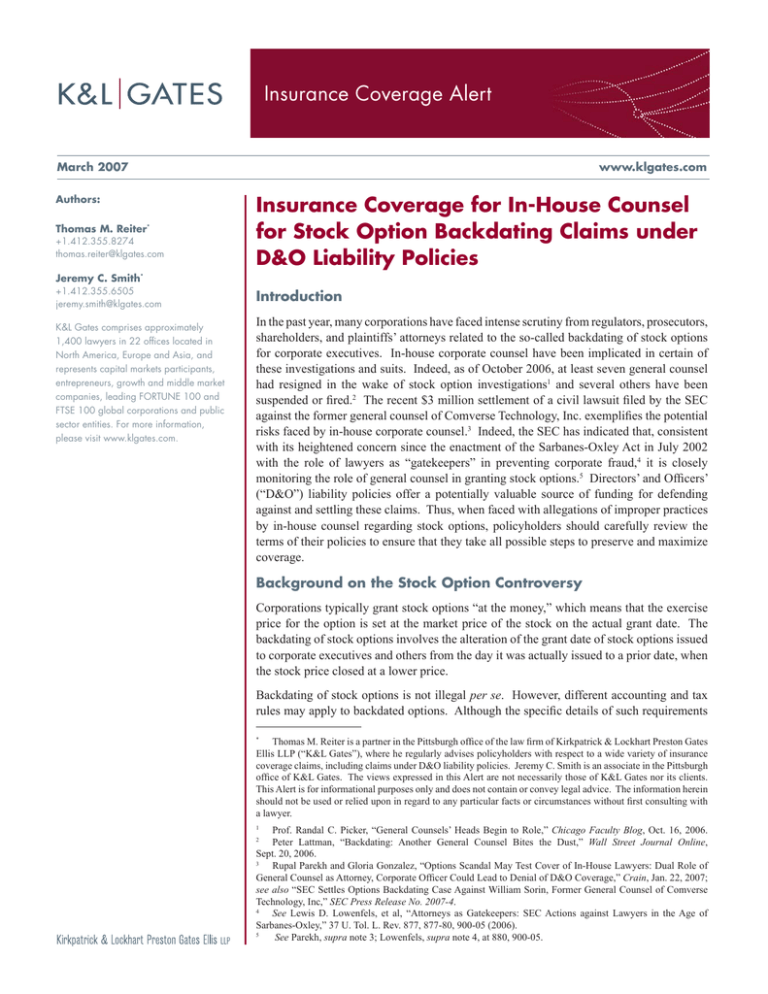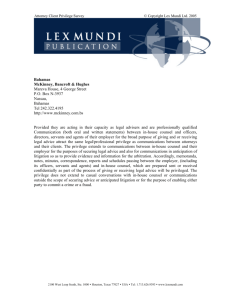
Insurance Coverage Alert
March 2007
www.klgates.com
Authors:
Thomas M. Reiter
*
+1.412.355.8274
thomas.reiter@klgates.com
Insurance Coverage for In-House Counsel
for Stock Option Backdating Claims under
D&O Liability Policies
Jeremy C. Smith*
+1.412.355.6505
jeremy.smith@klgates.com
K&L Gates comprises approximately
1,400 lawyers in 22 offices located in
North America, Europe and Asia, and
represents capital markets participants,
entrepreneurs, growth and middle market
companies, leading FORTUNE 100 and
FTSE 100 global corporations and public
sector entities. For more information,
please visit www.klgates.com.
Introduction
In the past year, many corporations have faced intense scrutiny from regulators, prosecutors,
shareholders, and plaintiffs’ attorneys related to the so-called backdating of stock options
for corporate executives. In-house corporate counsel have been implicated in certain of
these investigations and suits. Indeed, as of October 2006, at least seven general counsel
had resigned in the wake of stock option investigations1 and several others have been
suspended or fired.2 The recent $3 million settlement of a civil lawsuit filed by the SEC
against the former general counsel of Comverse Technology, Inc. exemplifies the potential
risks faced by in-house corporate counsel.3 Indeed, the SEC has indicated that, consistent
with its heightened concern since the enactment of the Sarbanes-Oxley Act in July 2002
with the role of lawyers as “gatekeepers” in preventing corporate fraud,4 it is closely
monitoring the role of general counsel in granting stock options.5 Directors’ and Officers’
(“D&O”) liability policies offer a potentially valuable source of funding for defending
against and settling these claims. Thus, when faced with allegations of improper practices
by in-house counsel regarding stock options, policyholders should carefully review the
terms of their policies to ensure that they take all possible steps to preserve and maximize
coverage.
Background on the Stock Option Controversy
Corporations typically grant stock options “at the money,” which means that the exercise
price for the option is set at the market price of the stock on the actual grant date. The
backdating of stock options involves the alteration of the grant date of stock options issued
to corporate executives and others from the day it was actually issued to a prior date, when
the stock price closed at a lower price.
Backdating of stock options is not illegal per se. However, different accounting and tax
rules may apply to backdated options. Although the specific details of such requirements
*
Thomas M. Reiter is a partner in the Pittsburgh office of the law firm of Kirkpatrick & Lockhart Preston Gates
Ellis LLP (“K&L Gates”), where he regularly advises policyholders with respect to a wide variety of insurance
coverage claims, including claims under D&O liability policies. Jeremy C. Smith is an associate in the Pittsburgh
office of K&L Gates. The views expressed in this Alert are not necessarily those of K&L Gates nor its clients.
This Alert is for informational purposes only and does not contain or convey legal advice. The information herein
should not be used or relied upon in regard to any particular facts or circumstances without first consulting with
a lawyer.
1
Prof. Randal C. Picker, “General Counsels’ Heads Begin to Role,” Chicago Faculty Blog, Oct. 16, 2006.
Peter Lattman, “Backdating: Another General Counsel Bites the Dust,” Wall Street Journal Online,
Sept. 20, 2006.
3
Rupal Parekh and Gloria Gonzalez, “Options Scandal May Test Cover of In-House Lawyers: Dual Role of
General Counsel as Attorney, Corporate Officer Could Lead to Denial of D&O Coverage,” Crain, Jan. 22, 2007;
see also “SEC Settles Options Backdating Case Against William Sorin, Former General Counsel of Comverse
Technology, Inc,” SEC Press Release No. 2007-4.
4
See Lewis D. Lowenfels, et al, “Attorneys as Gatekeepers: SEC Actions against Lawyers in the Age of
Sarbanes-Oxley,” 37 U. Tol. L. Rev. 877, 877-80, 900-05 (2006).
5
See Parekh, supra note 3; Lowenfels, supra note 4, at 880, 900-05.
2
Insurance Coverage Alert
are beyond the scope of this Alert, many of the current
investigations are focused on whether companies
followed the proper accounting rules, paid the
applicable taxes, and made the required disclosures
to investors. During the past year, the controversy
over backdating of stock options has intensified and,
by mid-October 2006, it was reported that at least
135 companies were under investigation by the SEC
relating to such issues.6 Many of these companies face
shareholder securities and derivative suits relating to
such investigations7 and, as of January 2007, the FBI
had initiated 61 criminal investigations relating to
stock options,8 and criminal charges have been filed
against certain directors and officers.9
professional services exclusions, the threshold issue is
why the in-house counsel has become a target of the
investigation or suit? If the in-house counsel is a target
merely because the in-house counsel received stock
options, this defense clearly should not apply. Even if
the in-house counsel has been named as a defendant
because of legal advice provided to the company,
the exclusion still should not apply. This is because
the exclusion should apply only to claims based
upon professional services provided to third parties.
Nevertheless, because the wording of professional
services exclusions varies, it is important to carefully
review the specific language of the professional
services exclusion.
Potential Coverage for In-House
Counsel under D&O Policies
Capacity
The availability of coverage may turn on a number
of policy provisions or insurer defenses, including the
issues described herein.
Insured Person
Insurers may attempt to contest claims by in-house
counsel for coverage related to the backdating of
stock options on the grounds that in-house counsel
defendants are not “insured persons” under the D&O
policy. Although typically the company’s general
counsel would be an officer and thus an insured, lower
level lawyers may not be officers. Nevertheless,
most, (but not all), D&O policies cover a company’s
employees for securities claims. Under these policies,
employees who are not officers should be covered
because claims relating to backdating of stock options
would presumably constitute securities claims.
Professional Services Exclusion
Insurers may attempt to rely upon the professional
services exclusion, which appears in some D&O
policies, to claim that coverage is precluded. Initially,
this defense will have no application to the many
D&O policies that do not have professional services
exclusions. With respect to those policies that have
6
Frank Ahrens, “Scandal Grows Over Backdating of Options,”
Wash. Post, Oct. 12, 2006.
7
See, e.g., Shareholder Derivative Complaint dated May 31,
2006, Ziering v. Levy, No. C-06-3512 (N.D. Cal.).
8
Jonathan Stempel, “FBI Has 61 Options Backdating Cases,”
Reuters, Jan. 10, 2007.
9
Criminal Complaint dated July 20, 2006, United States v. Reyes
and Jensen, No. 3-06-70450 (N.D. Cal.).
Insurers may contest coverage based upon the
“capacity” provision found in many D&O policies,
which, insurers will contend, requires that an insured
person be acting in his or her capacity as an officer or
director to be covered. Insurers may argue that where
an in-house counsel is a target because of his or her
role as counsel to the corporation, the in-house counsel
was not acting in the capacity of an officer and, thus, is
not covered. This defense should not apply because,
among other things, the duties of an in-house counsel
when acting as counsel to the corporation typically are
fully within the scope of an in-house counsel’s role as
an officer.
Employed Lawyers Professional
Liability Policies
Specialized policies, which are referred to as
employed lawyers professional liability policies
(ELPs), specifically cover in-house lawyers for their
professional liability. This coverage can be purchased
as separate, stand-alone policies or wrapped in with
a traditional D&O policy as an endorsement. As a
preliminary matter, whether or not it is necessary to
purchase an ELP policy depends on the wording of
the D&O policy as discussed above. If policyholders
choose to purchase an ELP policy, they should pay
close attention to the special exclusions and limitations
contained therein, including lower sub-limits, and
try to negotiate as favorable terms as possible. Of
particular importance, policyholders should ensure
that it is clear that whatever coverage is provided under
the ELP stand-alone policy or endorsement does not
limit the coverage afforded by the D&O policy itself.
March 2007 | 2
Insurance Coverage Alert
Other Provisions and Defenses
The availability of coverage may also depend upon
other policy provisions or insurer defenses including
the “claim” requirement, the definition of “loss,”
“remuneration” exclusions and so-called conduct
exclusions, the rescission defense, and coordination
of defense efforts requirements. Although a more indepth look at these provisions and defenses is outside
of the scope of this Alert, policyholders have several
strong arguments to counter insurers’ reliance upon
these provisions and defenses.10
10
See generally Thomas M. Reiter and Gregory S. Wright,
“Insurance Coverage for Stock Option Backdating Claims under
D&O Liability Policies,” Insurance Coverage Alert, October
2006.
K&L Gates comprises multiple affiliated partnerships: a limited liability partnership with the full name Kirkpatrick & Lockhart Preston Gates Ellis
LLP qualified in Delaware and maintaining offices throughout the U.S., in Berlin, and in Beijing (Kirkpatrick & Lockhart Preston Gates Ellis LLP
Beijing Representative Office); a limited liability partnership (also named Kirkpatrick & Lockhart Preston Gates Ellis LLP) incorporated in England
and maintaining our London office; a Taiwan general partnership (Kirkpatrick & Lockhart Preston Gates Ellis) which practices from our Taipei
office; and a Hong Kong general partnership (Kirkpatrick & Lockhart Preston Gates Ellis, Solicitors) which practices from our Hong Kong office.
K&L Gates maintains appropriate registrations in the jurisdictions in which its offices are located. A list of the partners in each entity is available
for inspection at any K&L Gates office.
This publication/newsletter is for informational purposes and does not contain or convey legal advice. The information herein should not be used
or relied upon in regard to any particular facts or circumstances without first consulting a lawyer.
Data Protection Act 1998—We may contact you from time to time with information on Kirkpatrick & Lockhart Preston Gates Ellis LLP seminars
and with our regular newsletters, which may be of interest to you. We will not provide your details to any third parties. Please e-mail london@
klgates.com if you would prefer not to receive this information.
©1996-2007 Kirkpatrick & Lockhart Preston Gates Ellis LLP. All Rights Reserved.
March 2007 | 3




